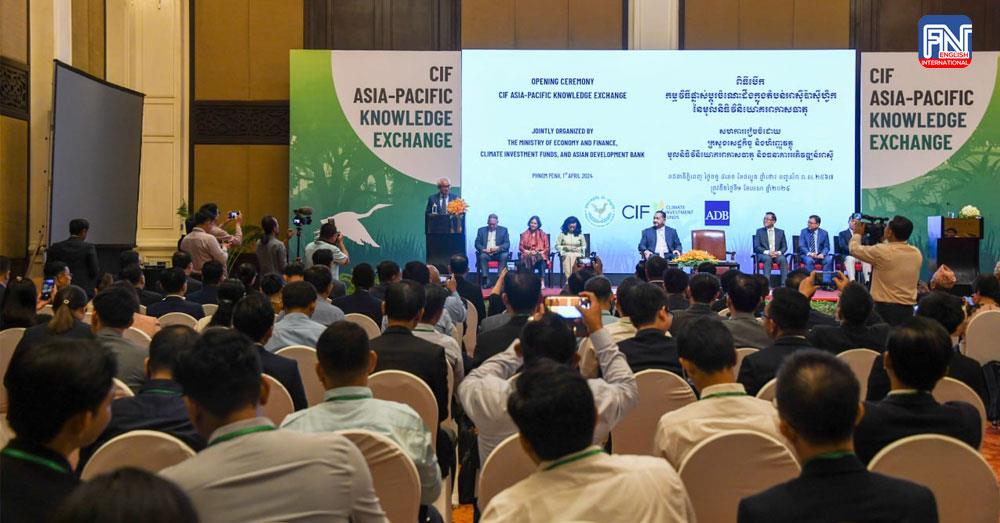Phnom Penh (FN), Apr. 1 – Cambodian Ministry of Economy and Finance, Climate Investment Funds (CIF), and the Asian Development Bank (ADB) hosted a high-level opening ceremony for “Asia-Pacific Knowledge Exchange (APKE)” on Monday (Apr. 1) joined by Excellencies, Ladies and Gentlemen, representatives of Ministries, Institutions, Development Partners, Higher Education Institutions, Research Institutions, Business Associations, Indigenous Communities, and Local Community Groups in the Kingdom of Cambodia as well as representatives from 13 other countries in the Asia-Pacific region including Bangladesh, Bhutan, Fiji, India, Indonesia, Kyrgyzstan, Laos, Nepal, Papua New Guinea, Philippines. Samoa, Tajikistan, and Tonga.
Climate Investment Fund (CIF) is a major financial institution established to address climate change, especially in middle- and low-income countries, through initiatives such as the Pilot Program for Climate Resilience (PPCR) and the Forest Investment Program (FIP). CIF is partnering with the Government of the Kingdom of Cambodia and the Asian Development Bank (ADB) to organize a four-day “Asia-Pacific Knowledge Exchange (APKE)” from 1 April - 4 April 2024 with the overarching objectives to: (1) facilitate the exchange of practical tools, best practices, success stories, and lessons learned among participating nations; (2) fill capacity gaps, as well as respond to learning demands from government officials and Multilateral Development Bank (MDB) partners; (3) promote dialogue around creating an enabling policy and market environment to support climate resilience, sustainable forest management, and nature-based solutions, and (4) promote regional partnerships and collaboration on shared issues and landscapes.
Cambodian Minister of Economy Aun Pornmoniroth opened the forum to set the tone for discussions, with Minister of Finance Samoa Hon. Lautimuia Afoa Uelese Vaai, Chief Executive Officer CIF, Tariye Gbadegesin, and ADB’s Warren Evans also delivering remarks.
CIF’s 15-year track record of climate finance results across Asia-Pacific has been tailored to the diverse climate challenges countries face in this region. CIF has paved the way for a more climate-resilient, sustainable Asia-Pacific by:
- Constructing or rehabilitating almost 3000 kilometers of climate-resilient roads across 16 projects in 11 countries internationally, with Cambodia accounting for almost half of the total length of roadworks (about 1500 km),
- Demonstrating the power of community-based climate adaptation models in Samoa, where sea-level rise presents an existential threat to communities every day,
- Piloting ecosystem-based adaptation for water security and building climate information services in Nepal,
- Showing the viability of private investments in climate-smart agriculture in Tajikistan and Bangladesh.
- Enabling and scaling up approaches to sustainable forest management that have already led to the mitigation of more than 4 million tons of CO2 and counting in Indonesia and Lao PDR
Minister of Economy and Finance Aun Pornmoniroth underscored, "The Royal Government of the seventh-mandate, under the wise leadership with a long-term vision of Samdech Thipadei Hun Manet, an outstanding and bright young leader, has adopted the “Pentagonal Strategy-Phase I” for growth, employment, equity, efficiency, and sustainability sets out five specific strategic goals, the fifth of which is to ensure the sustainability of socio-economic development and to build resilience to climate change. Cambodia has made ambitious climate commitments through the “Nationally Determined Contributions (NDC)” and the “Long-Term Strategy for Carbon Neutrality (LTS4CN)” to achieve carbon neutrality by 2050.”
Climate Investment Funds Chief Executive Officer, Tariye Gbadegesin stated, “The CIF has an extensive track record of partnering with countries and catalyzing climate actions through investments that build resilience for people, infrastructure, and ecosystems in some of the most climate-vulnerable countries in the world. Here in the Asia-Pacific region, we have so many rich examples of successes, as well as challenges. These are not just boxes to tick. They are real-world lessons from real projects that touched the lives of real people. The knowledge, experiences, and evidence give us more than an understanding of how we are building resilience against climate change. They help us learn and inform our future investments and interventions here in Cambodia, the Asia-Pacific region, and beyond.”
Asian Development Bank (ADB) Special Senior Advisor and Climate Envoy in the Office of the President Warren Evans underlined, “We are convinced that the battle against climate change will be won or lost in Asia and the Pacific. This is why the ADB, together with the CIF, have worked on transformational changes, not just in Cambodia, but all throughout Asia and the Pacific. And while we have already learned much about climate change mitigation, we’re always searching for better approaches to tackle climate change adaptation and long-term investments in resilience.”
“The partnership shown by our speakers this morning – a development bank and a multilateral climate fund, being guided in their work by the needs of our countries of operations – is the perfect illustration of how complex and multifaceted sustainable international development is, and how knowledge management is key to achieving lasting impact.”
About Climate Investment Funds
The Climate Investment Funds (CIF) is one of the largest multilateral climate funds in the world. Established in 2008 to mobilize finance for climate-smart solutions at scale in developing countries, CIF is the only climate fund working exclusively through 6 triple-A-rated multilateral development banks. Through large-scale, low-cost, long-term financing we lower the risk and cost of climate investment, helping to get first-of-their-kind projects off the ground and contribute to transformational change. To date, 15 contributor countries have pledged over US USD 12 billion, while our committed capital has unlocked more than USD 64 billion in additional financing in over 80 countries worldwide. Our country-led, flexible, and inclusive approach has successfully built track records in unproven green markets, incentivized governments to make bold investment decisions, and crowded in additional sources of finance for pioneering climate solutions.
=FRESH NEWS
